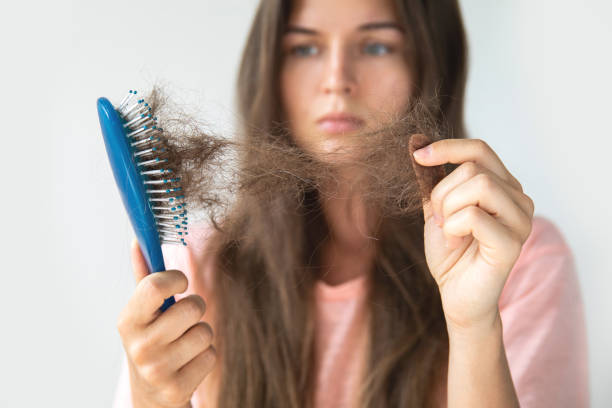Each strand of hair on our head has a life expectancy of two to five years. Active growth, transformation, and hair fall are all part of the hair follicle cycle. Because of circumstances and lifestyle factors, more of your hair may enter the resting phase, causing it to fall out. This process is also called Telogen effluvium in Medical terms.
Telogen effluvium can occur after conception, as a side effect of medication, or as a result of a medical problem. If you have bald areas, patchiness, or huge clumps of hair falling out, you should consult your general practitioner or a dermatologist.
There are actions you can do to protect the hair you do have, whether your hair loss is the result of a long-term or short-term health condition. Continue reading to find out how to maintain your hair strong and healthy.
Why Hairfall occurs
Hair loss can be temporary or permanent, and it can affect only your scalp or the entire body. It might be caused by inheritance, hormonal changes, medical issues, or just ageing. Men are more likely than women to lose hair from their heads.
Male and female baldness are both inherited. The hair on the temples and crown of the head tends to fall out in males. Hair generally thins down across the head in females.
Androgenetic alopecia is more common as people become older, but it can begin at any time after puberty. Many women with androgenetic alopecia get it after they have gone through menopause. This suggests that hormones may have a role in the situation.
Some of the common factors which accelerates Hairfall are:
Family history (heredity)
Medications and supplements
Hormonal changes and medical conditions
Radiation therapy
Hairstyles and Treatments
Stress
How can we Prevent Hairfall?
Avoid Pulling Hair Styles
Although hair is flexible, research has shown that it can only be stretched so far before getting irreversibly damaged. Cornrows, tight braids and ponytails can pull your hair out from your scalp over time, loosening the tie between your hair and scalp.
Minimizing Heating Hair
When you use heat to look your best, the follicles become dry and sensitive to damage. Hairdryers, straighteners, curling irons and other styling products can all cause harm to your hair in the long run.
Use Light Shampoo
When you use heat to look your best, the follicles become dry and sensitive to damage. Hairdryers, straighteners, curling irons and other styling products can all cause harm to your hair in the long run.
The shampoo is used to clean your hair and remove particles and excess oil. Mix up your products if you’re losing a lot of hair.
On the other hand, many commercial shampoos include harsh ingredients. They can deplete your hair with the natural oil and fatty acids that keep it strong and silky after only one application. Examine your shampoo’s ingredients and attempt to buy one that is as natural as possible. Mix up your products if you’re losing a lot of hair.
Hair follicles are irreversibly damaged by chemicals used in hair treatments. Limit your usage of colours, highlights, peroxide treatments, and perms if you’re worried about hair loss.
Use a brush made of natural fibres with soft bristles.
Healthy sebum (oil) levels in your hair are promoted by using a natural fibre brush with gentle bristles. Because keratin proteins in your hair are piled like shingles on a roof, carefully brushing them in one way from top to bottom can help smooth and condition your hair cuticle on a molecular level. Brushing your hair on a regular basis can also help you avoid hair clumps in your shower drain.
Use Supplements
Hair loss can be caused by nutritional inadequacies. Supplementing with iron, zinc, niacin, selenium, vitamin D, and vitamin B-12 can help your body develop strong, healthy hair. Remember that supplements aren’t evaluated by the US Food and Drug Administration, so only buy them from reputable suppliers (FDA).
Massage your Scalp
Massage of the scalp has been proven to be beneficial. A reliable source for hair growth. If you gently massage your scalp every time you wash your hair, it may help your hair grow faster by boosting circulation in the growth region.
Quit Smoking
Smoking causes your hair cells to age prematurely, leaving your hair follicles fragile and vulnerable to damage. Check with your doctor to establish the best smoking cessation plan for you.
Keep Proper Diet
Including nuts and seeds in your diet can significantly enhance your hair’s condition. Nuts and seeds have a nutrient-dense composition that can help prevent and halt hair loss.
Everything from an upset stomach to increasing the texture of your hair to giving your complexion that beautiful sheen may be fixed with a bowl of curd.
Eggs are high in protein, biotin, selenium, and zinc, all of which aid hair development and restore nutrients lost via shedding.
Fruits and berries are high in antioxidants, Vitamin C, and minerals, all of which are beneficial to your health. Fruits can help to strengthen hair follicles and promote hair growth. Vitamin C, found in fruits and berries, aids in the absorption of iron and the production of collagen, both of which are necessary for good hair health.
Conclusion
If you think your hair loss is more than typical shedding or transitory telogen effluvium, you should consult your doctor. Hair that falls out in clumps and leaves bald places, as well as hair that grows in patches, might be signs of a health problem. If you need further information, go to your dermatologist or general practitioner and discuss your symptoms.
